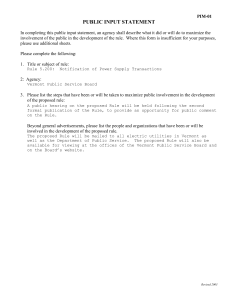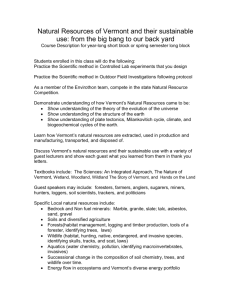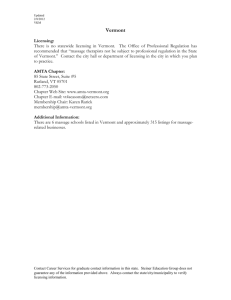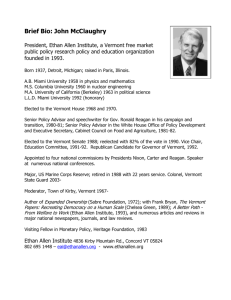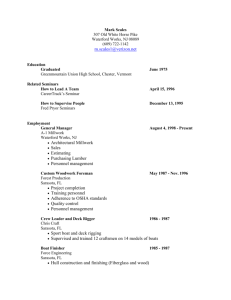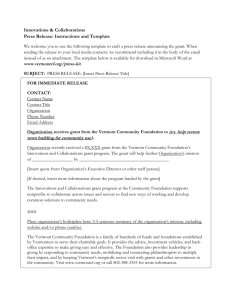Syllabus 395 Milk to Maple Summer 2013 (1)
advertisement
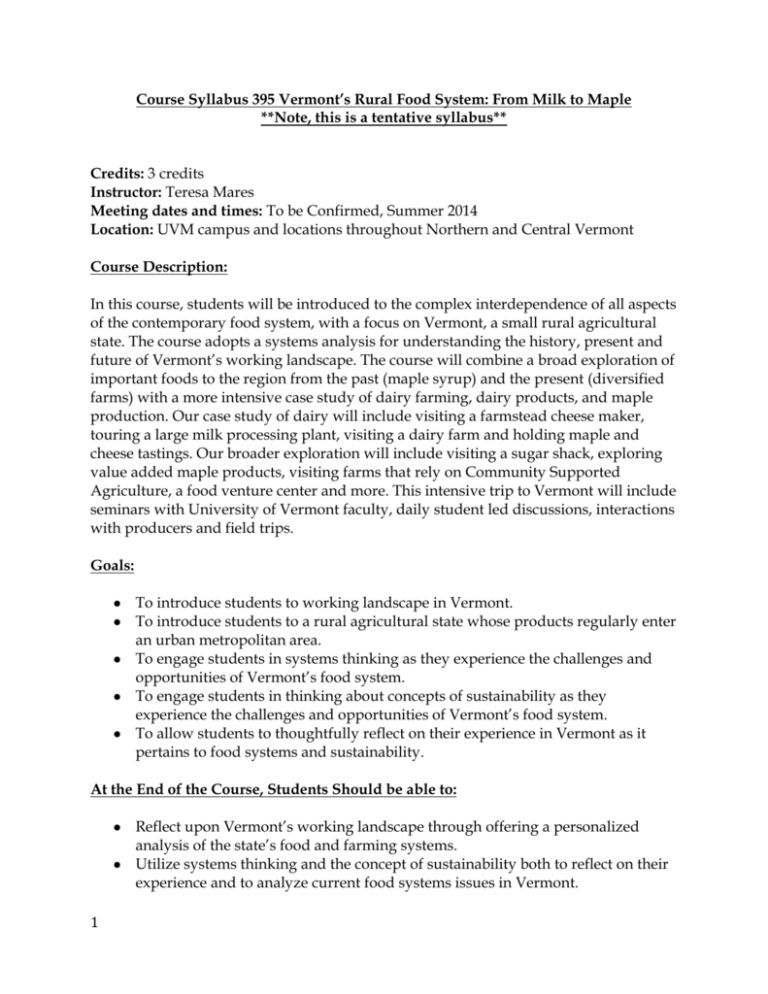
Course Syllabus 395 Vermont’s Rural Food System: From Milk to Maple **Note, this is a tentative syllabus** Credits: 3 credits Instructor: Teresa Mares Meeting dates and times: To be Confirmed, Summer 2014 Location: UVM campus and locations throughout Northern and Central Vermont Course Description: In this course, students will be introduced to the complex interdependence of all aspects of the contemporary food system, with a focus on Vermont, a small rural agricultural state. The course adopts a systems analysis for understanding the history, present and future of Vermont’s working landscape. The course will combine a broad exploration of important foods to the region from the past (maple syrup) and the present (diversified farms) with a more intensive case study of dairy farming, dairy products, and maple production. Our case study of dairy will include visiting a farmstead cheese maker, touring a large milk processing plant, visiting a dairy farm and holding maple and cheese tastings. Our broader exploration will include visiting a sugar shack, exploring value added maple products, visiting farms that rely on Community Supported Agriculture, a food venture center and more. This intensive trip to Vermont will include seminars with University of Vermont faculty, daily student led discussions, interactions with producers and field trips. Goals: To introduce students to working landscape in Vermont. To introduce students to a rural agricultural state whose products regularly enter an urban metropolitan area. ● To engage students in systems thinking as they experience the challenges and opportunities of Vermont’s food system. ● To engage students in thinking about concepts of sustainability as they experience the challenges and opportunities of Vermont’s food system. ● To allow students to thoughtfully reflect on their experience in Vermont as it pertains to food systems and sustainability. ● ● At the End of the Course, Students Should be able to: Reflect upon Vermont’s working landscape through offering a personalized analysis of the state’s food and farming systems. ● Utilize systems thinking and the concept of sustainability both to reflect on their experience and to analyze current food systems issues in Vermont. ● 1 ● Apply their understanding of the various meanings of sustainability to urban and rural food environments. General Course Information: ● ● ● ● ● We expect professional standards of behavior. This is a quick and intensive course. All students should come to Vermont prepared to attend all planned activities at the times indicated on the schedule below. During discussions or field trips cell phones and pagers should be on vibrate or turned off. Everyone will be traveling together in one van so everyone needs to be ready each morning by the scheduled departure time. We expect participation from every student. This promises to be a completely participatory learning experience. Seize the day. Contribute to discussions. Ask lots of questions. All readings must be read completely and all reflections must be completed. We see this as a course that relies on dialogue that emerges from your engagement with your experience. We do not accept late assignments. If you hand in an assignment late, you will be marked down a five points for every day the assignment is overdue. All assignments need to satisfy the standards of academic integrity. Plagiarism (not attributing other people’s ideas, arguments or phrases properly) and cheating will result in a failing grade. Required and Recommended Readings: With the exception of Albers, all readings available on Blackboard Required prior to travel immersion: Albers, J. (2000). Hands On The Land: A History Of The Vermont Landscape. Cambridge, MA: The MIT Press. Chapters 3-5 Required Chapters 1-2 Recommended ● Meadows, D.H. (2008). Thinking in Systems: A Primer. White River Junction, VT: Chelsea Green Publishing. Introduction and Chapter 1 Required ● Meadown, D.H. (1999) Leverage Points: Places to Intervene in a System. Hartland, VT: The Sustainability Institute. ● Kloppenburg Jr., J., Lezberg, S., De Master, K., Stevenson, G. W., & Hendrickson, J. (2000). Tasting Food, Tasting Sustainability: Defining the Attributes of an Alternative Food System with Competent, Ordinary People. Human Organization, 59(2), 177-186. ● 2 ● ● ● ● ● ● ● Heller, M. C., & Keoleian, G. A. (2003). Assessing the sustainability of the US food system: a life cycle perspective. Agricultural Systems, 76, 1007-1041. Pimbert, M. P., Thompson, J., Vorley, W. T., Fox, T., Kanji, N., & Tacoli, C. (2001). Global Restructuring, Agri-Food Systems and Livelihoods (Vol. Gatekeep Series no. 100). London: International Institute for Environment and Development: Sustainable Agriculture and Rural Livelihoods Program. Vermont Sustainable Jobs Fund. (January 2011). Farm To Plate Strategic Plan: Executive Summary. Burlington. Paxson, H. (2013). The Life of Cheese: Crafting Food and Value in America. Berkeley, CA: University of California Press. Chapters 1, 2, and 7 Required. Mares, T. & Alkon, A. (2011). Mapping the Food Movement: Addressing Inequality and Neoliberalism. Environment and Society, 2, 68-86. Allen, P. & Sachs, C. (1991) The Social Side of Sustainability. Science as Culture, 2(4), 569-590. London: Free Association Books. Parsons, B. (ND). Vermont Dairy Sector: What is the Future of the 800lb Gorilla? White paper, University of Vermont. Burlington, VT. Readings that will bring depth to experiences: ● ● ● ● ● ● Trubek, A. B. (2008). The Taste of Place: A Cultural Journey Into Terroir. Berkeley and Los Angeles: University of California Press. Introduction and Chapter 6. Ayres, J. & Bosia, M. (2011). Beyond Global Summitry: Food Sovereignty as Localized Resistance to Globalization. Globalizations, 8(1): 47-63. Wirzba, N. (ed). (2004). The Essential Agrarian Reader. Selected Chapters. Washington, DC: Shoemaker and Hoard. Hewitt, B. (2011). The Town That Food Saved: How One Community Found Vitality In Local Food. Selected Chapters. New York: Rodale Press. Lovell, S. T., DeSantis, S. r., Nathan, C. A., Olson, M. B., Mendez, V. E., Kominami, H. C., et al. (2010). Integrating Agroecology and Landscape Multifunctionality in Vermont: An evolving framework to evaluate the design of agroecosystems. Agricultural Systems, 103(2010), 327-341. Food Chain Workers Alliance. (2012). The Hands that Feed Us: Challenges and Opportunities for Workers Along the Food Chain. Los Angeles, CA: Food Chain Workers Alliance. Student Evaluation/Assessment and Course Assignments: Systems Paper: Students will write a 2-3 page paper that applies a systems analysis to food and farming in Vermont, developing a preliminary definition of Vermont’s food system. This initial paper is due and will be discussed the first day of the travel immersion. Students should prepare this paper after completing the readings prior to the travel immersion and bring a hard copy of this paper to the first day of class. 3 Individual Journal Responses: Individuals will write 5 journal responses of 400-500 words on the following visits. Journals should all be uploaded to Blackboard by the end of the day on Tuesday, July 2nd. Burlington Northeast Kingdom Montpelier Addison County Northwest Vermont Reflective Essay: Students will write a 5-page reflective essay that integrates experiences in Vermont with an analysis of the food system. Essays should be uploaded to Blackboard by the end of the day on Monday, July 8th. Application Paper: Students will write a 8-page paper that allows them to apply the theoretical frameworks and concepts from the course to an ongoing or proposed research project or relevant scenario. In this paper, students should utilize at least 7-10 sources connected to their thematic focus (these can be drawn in part from recommended readings above). Application papers should be uploaded to Blackboard by the end of the day on Monday, July 15th. Throughout the paper, students will develop and apply a critical analysis that utilizes the following frameworks: Sustainability Systems thinking Social movements For instance, a graduate student may decide to write their paper on how these themes connect with their ongoing or proposed thesis, whereas someone engaged in an internship project might write their paper on developing a program and event for a community-based organization. Percentage Contribution of Each Assignment: Systems Paper: 10% Participation in Discussions (of all sorts; online and face-to-face): 20% Individual Journal Responses on Site Visits and Investigation: 20% Reflective Essay: 20% Application Paper: 30% Tentative Travel Immersion Schedule: (Note, this is the 2013 schedule and will be revised for 2014) 4 Day One (Burlington and Winooski) New Farms for New Americans Tour, Burlington Visit with Vermont Works for Women FRESH Food Program, Winooski and Lunch Systems Thinking Discussion on Campus Dinner Together, Location TBA Day Two (Montpelier) Vermont Sustainable Jobs Fund New England Culinary Institute and Vermont Fresh Network Lunch Vermont Agency of Agriculture and Food Markets Hunger Mountain Cooperative Dinner on own (Back to Burlington around 6pm) Day Three (Northeast Kingdom) Overnight Stay at Lakeview Inn High Fields Center for Composting Picnic Lunch Jasper Hill Farm Couture’s Maple Shop Dinner at Claire’s Day Four (Northeast Kingdom) Overnight Stay at Lakeview Inn Center for an Agricultural Economy and Food Venture Center Picnic Lunch Additional sites in NEK to be determined Day Five (Addison County) Intervale Shelburne Farms Twig Farm Cabot Creamery Dinner at Folino’s Pizza Day Six (Burlington) Optional Trip Farmers’ Market Afternoon: off – work on investigations, reflections, etc. Day Seven Off – work on investigations, reflections, etc. Day Eight (Northwest Vermont) 5 St. Albans Cooperative Creamery Green Winds Farm Lunch The Farm Between Boyden Valley Farm Dinner on Own, Back to Burlington around 6-6:30pm Day Nine (Wrap up) Closing Thoughts Maple Tasting Wrap up around noon 6
